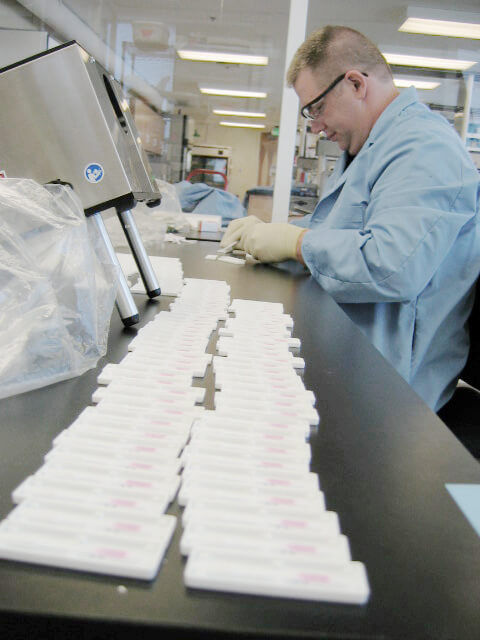Science expands our understanding, makes the impossible possible, and helps us build the future we want for all people. Science drives the work of our
Global Health Technologies Coalition, so we wanted to take a step back to reflect on five ways science is transforming global health:
1. Science is generating treatments, cures, and vaccines to tackle the world’s most devastating diseases.
From a vaccine that has put us at the brink of eradicating polio to antiretroviral treatments that have dramatically extended the lives of people living
with HIV and AIDS, science has generated new health technologies that have driven tremendous progress in global health. Thanks to investments in science
and research, 82 new vaccines, drugs, diagnostics, and other lifesaving global health tools have been developed and introduced since 2000. These tools
include a new meningitis A vaccine—which has already saved 378,000 lives and prevented
673,000 new infections since 2010—and new child-friendly malaria drugs that have
helped cut childhood malaria deaths by 65 percent since 2000. Science has also fueled a robust pipeline of over 670 global health technologies now
in development poised to further build upon these gains.
2. Science is helping us understand the unique needs of users and communities so we can design the right tools for impact.
 A scientist assembles a point-of-care diagnostic test. Photo: PATH/Dan ChangDriving progress in global health is not just about developing tools that work; it’s about developing tools that work for the communities and contexts
in which they are used. A diagnostic test won’t help us identify and control an emerging epidemic unless it can be administered on the spot in remote
communities and deliver results quickly. Likewise, a woman is not likely to adopt a new contraceptive or HIV and AIDS prevention method unless it’s easy-to-use,
comfortable, affordable, and fits in with her lifestyle and culture. Through surveys, data analysis, diagnostics, and user testing, science is enabling
us to study end users and the environments and social systems in which they operate. This helps us better understand the complexity of their unique
needs and design and refine technologies to deliver the most effective solutions for impact.
A scientist assembles a point-of-care diagnostic test. Photo: PATH/Dan ChangDriving progress in global health is not just about developing tools that work; it’s about developing tools that work for the communities and contexts
in which they are used. A diagnostic test won’t help us identify and control an emerging epidemic unless it can be administered on the spot in remote
communities and deliver results quickly. Likewise, a woman is not likely to adopt a new contraceptive or HIV and AIDS prevention method unless it’s easy-to-use,
comfortable, affordable, and fits in with her lifestyle and culture. Through surveys, data analysis, diagnostics, and user testing, science is enabling
us to study end users and the environments and social systems in which they operate. This helps us better understand the complexity of their unique
needs and design and refine technologies to deliver the most effective solutions for impact.
3. Science is helping us predict, detect, and track emerging health risks so we can be better prepared to confront tomorrow's challenges.
From using weather patterns to forecast the risk of insect-borne disease outbreaks, to employing genomics and evolutionary theory to predict how bacteria will become resistant to antibiotics, to advancing new hybrid systems that combine crowdsourced data with traditional disease surveillance, science is helping us better predict, detect, and track infectious disease outbreaks
and other emerging health challenges. Early detection can make the difference between an outbreak becoming an epidemic and is critical to mounting
an effective response.
4. Science is helping us understand what works and what doesn't so we can better target interventions and design health programs for maximum impact.
How often does an insecticide-treated bed net need to be replaced,
and how many tears can it sustain before its stops working? In an era of limited resources, can we predict which technologies and interventions are likely to save the most lives in a country if brought to scale? How do we get people to change their handwashing habits to reduce diarrheal disease and childhood deaths? These are the questions big and small that scientists,
data analysts, and other health researchers are working to answer in labs, offices, and program sites across the United States and world. The answers
they get are helping us better target health solutions and refine health programming to more save lives and more dollars.
5. Science is putting information and data at our fingertips to help us fight global diseases and health challenges in new and unusual ways.
The revolution in mobile technology, digital health, and big data is transforming our approach to fighting global diseases and health challenges. Health
care workers are using mobile devices to track immunization coverage door-to-door and monitor vaccine supplies to prevent stockouts, doctors are using SMS to remind patients to take their tuberculosis drugs and treatment adherence, and health ministries are deploying new data visualization toolsto turn a mountain of data into accessible and actionable information to guide decision on to best deploy and target resources.
Science creates a foundation upon which improvements in global health are built. It unlocks discoveries and fuels innovation, informs policies and programs,
breaks down barriers, and ultimately advances better, healthier lives for all people. At this moment in time, it is more vital than ever that we build
a convincing case of the benefits that flow from science and the importance of strong investment in science and research.
In global health, science matters because #scienceserves and science saves.

